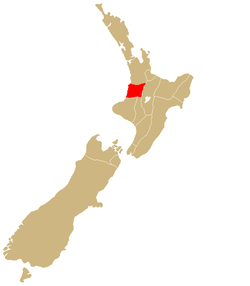Ngāti Paretekawa
| Ngāti Paretekawa | |
| Iwi of New Zealand | |
|---|---|
 | |
| Rohe (region) | King Country |
| Waka (canoe) | Tainui |
Ngāti Paretekawa (Paretekawa) are a very numerous hapū (sub-tribe, or clan) of the Ngāti Maniapoto confederation in New Zealand, whose ancestral tribal lands are located in both the northern King Country and South Waikato Districts, including the areas around the Kakepuku, Pirongia, Wharepuhunga, Rangitoto maunga (Mountains) in the vicinity of Te Awamutu, Kihikihi, Waikeria, Pokuru, Kakepuku, and Kawhia, with sub-hapu interests in the southern King Country area of the Mokau ki Runga basin, at the foothills of Kahuwera Mountain. Paretekawa traditions recount that the Ngati Paretekawa hapu origins became recognised in the period of Peehi Tukorehu and his Tuakana (elder brothers) Te Uaki, Te Akanui, and Te Rangihiroa and tuahine (sister) Whaeapare II. while others who descend from Tukorehu dispute this assertion, allegedly based on evidence by Te Winitana Tupotahi. Peehi Tukorehu was grand father of Te Winitana Tupotahi, and grand uncle of Manga Rewi Maniapoto,
Many important rangatira of Maniapoto, Raukawa and Tuwharetoa have whakapapa connection to the tupuna Paretekawa including; Manga (Rewi) Maniapoto, Raureti Paiaka, Te Huia Raureti father of Te Kohika and Te Whakataute Te Huia, Hitiri and his sister Ahumai Te Paerata, Tupotahi, Tukorehu II, and others.
According to Māori Land Court evidence given by Te Winitana Tupotahi and Te Kohika Te Huia, as a result of a disagreement between Peehi Tukorehu and one of his tuakana (elder sibling) Te Akanui, while at Haerewawatea, a section of Ngati Paretekawa and Ngati Kaputuhi, and others under the leadership of their chief Te Akanui, including Rewi Manga Maniapoto, Paiaka, and others, shortly after the Haereawatea incident, left for Kawhia and settled eventually in the Mokau region to the south, leaving only that section of Ngāti Paretekawa under Peehi Tukorehu, his elder brother Te Rangihiroa, and sister Wheapare II, and their whanau and Ngati Paretekawa hapu, in occupation of their ancestral tribal lands in the Otawhao, Moeawha and Turata district.
The eventual invasion of those lands by British forces in 1864 saw the final loss of the bulk of those ancestral tribal lands to Crown confiscation by the Crowns Government in New Zealand-Aotearoa.